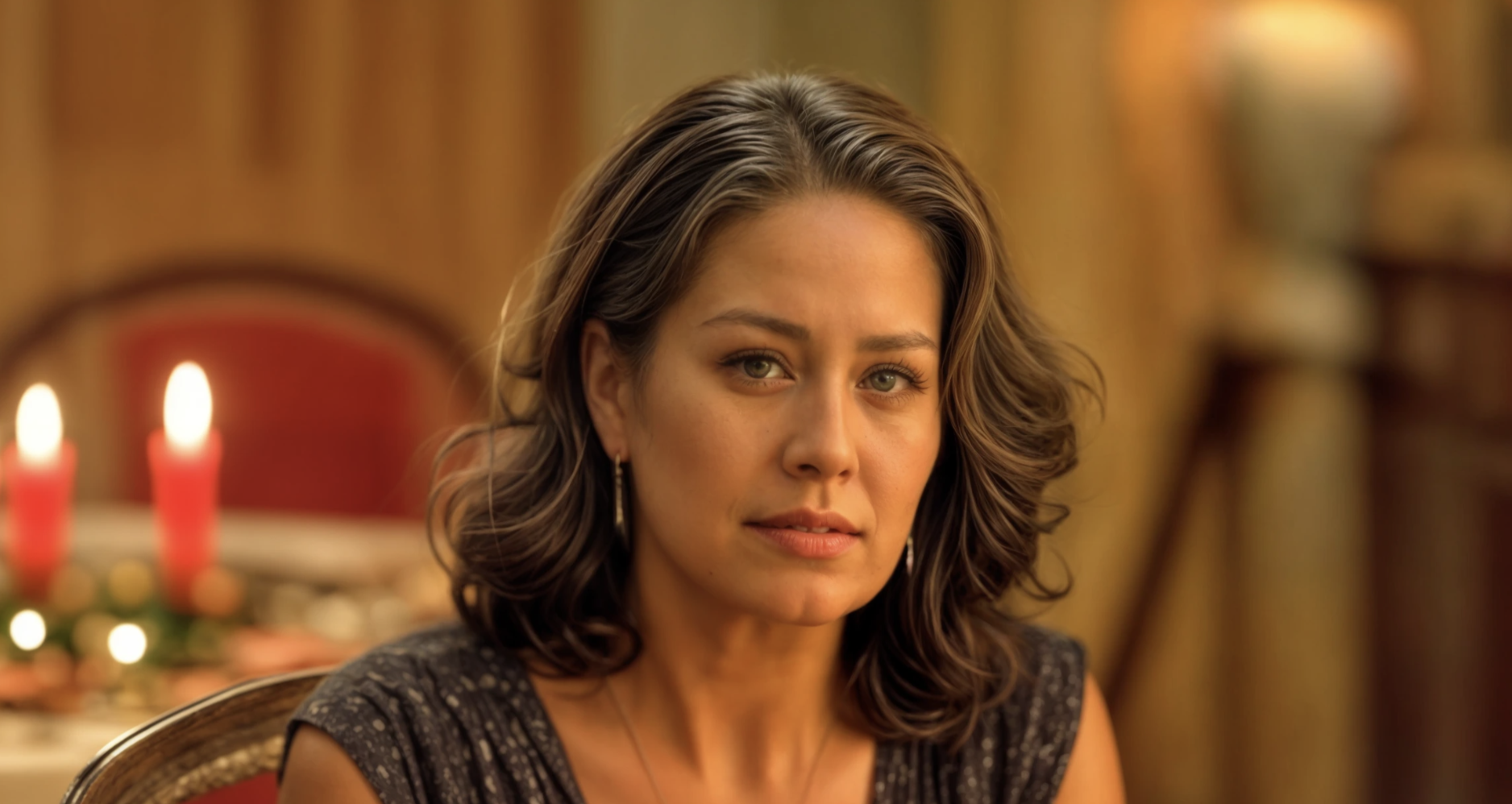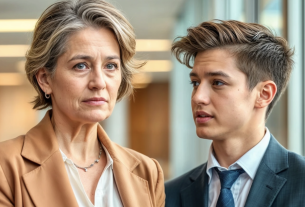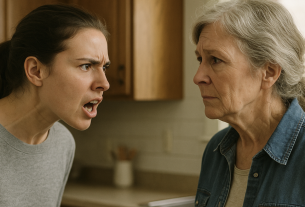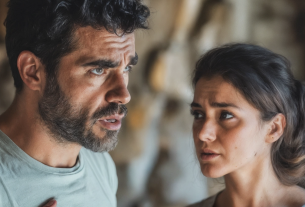“Three thousand,” Pavel suddenly said, still not looking up. “Got it with a discount at ‘Sunlight.’”
“Thank you,” she said quietly. “It’s beautiful.”
Something pricked her chest. Not that she was expecting diamonds—what diamonds at their age! But this mundanity, this accountant’s precision. As if he were reporting the purchase of bread.
Marina stood for a long time in front of the mirror, scrutinizing her new hairstyle. No, this haircut didn’t suit her after all—too youthful. At fifty-seven, it was too late to experiment. Although Lyuba, the hairdresser, assured her she now looked at least ten years younger.
“Who needs that?” Marina thought, adjusting a rebellious strand. Pavel used to love running his fingers through her hair, saying it smelled like summer. And now? When was the last time he even paid attention to her appearance?
Today was their thirtieth wedding anniversary. A milestone, a serious date. Marina got up early to prepare something special for dinner. She took out her favorite apron from the closet—a white one with embroidered daisies, a gift from her daughter. She began kneading the dough for “Napoleon” — a cake without which no family celebration was complete.
Thirty years. How quickly they had flown by. It felt like the wedding was just yesterday—modest, in the factory canteen where Pavel worked. She wore a simple white dress sewn by her mother; he wore a suit borrowed from someone else’s shoulder. But what plans they made! They dreamed of traveling, a big house, how they would grow old together.
“Pash, do you remember how you promised me when we were young that you’d take me to Paris for our thirtieth anniversary?”
She deliberately asked lightly, as if joking. Not to reveal how much she was waiting for this day, how she hoped.
Marina smiled, looking at the tiny ring in the red velvet box. Silver, three cubic zircons—modest but tasteful. Just in line with the last years of their life together.
Her husband mumbled something in reply, not taking his eyes off the phone. His fingers quickly swiped across the screen—probably some important work messages again. Lately, he had been hiding behind that screen more and more, as if it became a shield between them.
Marina remembered when it started. About a year ago, Pavel suddenly “got into” a healthy lifestyle. Bought a membership at an expensive fitness club, started watching his diet. She was happy at first—a man his age needed to take care of himself. But then she began to notice changes: new clothes, expensive perfume, constant “business meetings” in the evenings.
“Well, whatever,” Marina thought. “The main thing is that he hasn’t forgotten the anniversary.”
She tried on the ring. It fit perfectly—after thirty years of marriage, Pavel at least learned to guess her size. Though the stones somehow glittered strangely in the chandelier light. Marina brought her hand closer to her eyes.
“Three thousand,” Pavel suddenly said again, still not looking up. “Got it with a discount at ‘Sunlight.’”
“Thank you,” she said quietly. “It’s beautiful.”
Something pricked her chest again. Not that she expected diamonds—what diamonds at their age! But this mundanity, this accountant’s precision. As if he were reporting the purchase of bread.
Suddenly, she remembered how twenty years ago he gave her a pendant—simple but bought on credit because he really wanted to make her happy. Back then, they lived quite modestly, counting every penny, but Pasha always found a way to please her. He brought flowers from work—even if not roses, just ordinary carnations, but every Friday. And now, when they had many times more money.
That evening they didn’t even have dinner together—Pavel had “urgent matters,” had to go to a meeting. The cake remained untouched, the bottle of champagne unopened. Marina sat at the table, absentmindedly poking the cold pilaf with a fork.
After dinner, she took out an old photo album with a worn leather cover. The pages had yellowed, some photos had faded, but the memories were bright as if from yesterday.
There they were young—tanned, happy, at the sea. Their first vacation together, saved up by the whole family. Pavel hugged her shoulders; she laughed—she had just caught a jellyfish and got scared.
And here was the first car—a rusty “nine,” but how happy they were with it! They unloaded freight wagons at night at the goods station to save for the first payment. So many plans they made.
Between the pages fell a note folded in quarters. Pavel’s handwriting, still young and bold: “I love you, Marisha!”
The phone quietly chimed. A message from Tanya, a friend:
“Turn on the ‘Capital’ channel! Quickly!”
Tanya was always like that—emotional, impulsive. In youth, Pavel was even jealous of their friendship: “You’re always whispering with her!” And now. Now he seemed not to care at all who she talked to.
Marina reached for the remote. On the screen was some report about Moscow restaurants. The camera slowly glided across the hall of an expensive establishment; the announcer’s voice talked about the new chef.
And then she saw him. Pavel sat at a table by the window, wearing that burgundy tie she gave him for his last birthday. Opposite him—a striking blonde about forty, in a tight red dress. She was animatedly talking, waving her hands. A gold bracelet glittered on her wrist.
“Stop. Bracelet.”
Marina leaned forward, almost pressing her nose to the screen. Yes, exactly—the same as in the photo on Pavel’s phone. She had accidentally seen that photo a month ago when her husband asked her to find some document pictures in his gallery. Then he quickly snatched the phone away: “Just an ad for watches.”
Her hands trembled. Her temples throbbed. On the screen, Pavel was saying something to his companion, smiling that special smile Marina hadn’t seen for many years.
A new message from Tanya:
“That’s Victoria; she trains at our fitness center. Thirty-eight years old, divorced, works at some cosmetics company. She bragged that her lover gave her a trip to Paris for the May holidays.”
May holidays. In a week.
Marina sank into the chair, clutching the phone. One thought pounded in her head: “Three thousand. With a discount.”
And for her — Paris.
When Pavel came back after midnight, Marina was still awake. Sitting in the kitchen, in front of her—an untouched cup of cold tea.
“Why aren’t you sleeping?” He tried to kiss her on the cheek, but she pulled away.
“How did the meeting go?” she asked in an unexpectedly clear voice.
“Fine. Just tired.”
“At ‘La Mare’?”
He froze. For a second, something like fear flashed in his eyes but quickly changed to his usual confidence:
“Oh, you mean the report? Yeah, there. I met with partners.”
“Partner,” Marina stood up. “When are you flying to Paris? For the May holidays?”
“What nonsense? What Paris?”
“Don’t make a fool of me, Pasha,” her voice trembled. “I know everything. About Victoria. About the trip. About everything.”
He was silent. Then heavily sat down:
“So what now? Are you going to make a scene? A hysterics? At our age, it’s too late.”
“Too late for what?” she almost shouted. “Too late to respect your wife? Too late to be honest? Three thousand, Pasha! You spent three thousand on a ring for your wife but give Paris to your lover?!”
“What did you want?” he suddenly raised his voice too. “Thirty years in one apartment, in one bed! Look at yourself—your robe is worn out, those eternal curlers.”
“I raised your children! Cooked, washed, ironed your shirts!”
“Exactly!” He stood up, looming over her. “You weren’t a wife, you were a housekeeper! And Vika—she sees a man in me. She enjoys talking with me, not just about grandchildren and varicose veins!”
Marina silently looked at him. Thirty years. Half a life. And like that—a “housekeeper.”
“You know what,” she said quietly. “Fly to your Paris. Just sign the divorce papers before you leave.”
“Come on,” he tried to take her hand. “I got carried away. Forgive me. Let’s forget everything, okay?”
She shook off his hand:
“No, Pasha. Not now.”
A month later, Marina sat in a cafe with Tanya. No ring on her ring finger—neither the cheap one nor the wedding band.
“Can you imagine,” her friend said, “that Victoria came back from Paris and immediately to our center. All in tears! Turns out your husband spent the whole trip talking on the phone about work. Didn’t take her to the Louvre—‘no time.’ Took her to a restaurant once, and even that to some dive.”
Marina laughed:
“Yeah, romantic.”
“And you? How are you coping?”
“You know,” Marina thought. “The first week I cried. The second—I was angry. And then. I signed up for Spanish classes. I’d dreamed of it for a long time but never had time. And I go to the pool. And you know what’s the strangest? I seem to have woken up.”
She was silent, looking out the window:
“Yesterday my granddaughter asked, ‘Grandma, why have you become so beautiful?’ And I really had. Got a new haircut, bought a dress. For the first time in so many years—just for myself, not for anyone else.”
“And Pavel?”
“What about Pavel,” Marina shrugged. “They say Victoria dumped him. He called a few days ago, asked to come back. I refused.”
“Do you feel sorry for him?”
“I did. But now. You know, I bought a ticket. To Paris.”
“Alone?!”
“Alone,” Marina smiled. “I’ve dreamed of it for a long time. So what? I’m only fifty-seven—perfect time to start living for myself.”
For the first time in many years, she felt truly free.
And six months later, Sergey appeared in her life—a widower, a Spanish teacher. They met at the classes, started talking. And one day he invited her to a cafe.
“You know, Marina,” he said, looking into her eyes, “let’s go to Paris together next time? I’m going there for a conference.”
She laughed:
“Let’s. Just not in May—too many tourists then.”
They say life begins after fifty. Marina now knows—it’s true. You just need to decide to wake up and start living for yourself.
And the three-thousand-ruble ring? She gave it to her granddaughter—for her dolls. The most fitting use.



